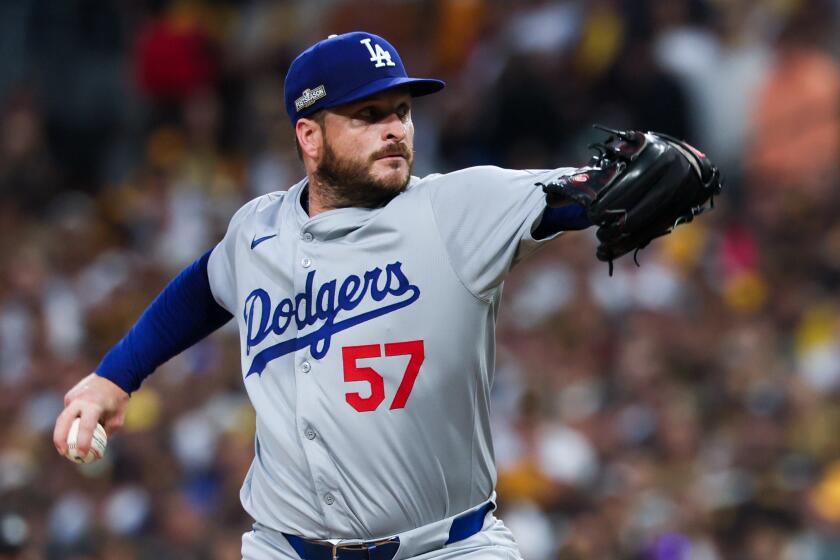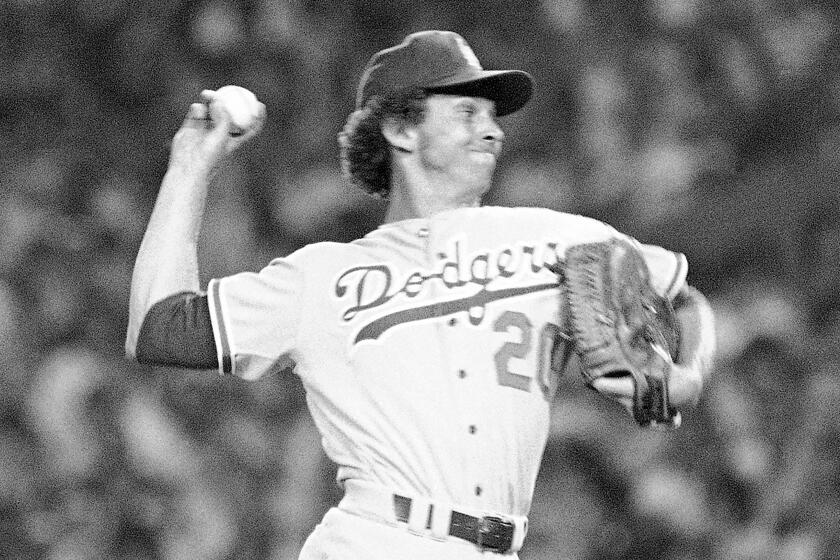Column: Are the Dodgers ruining baseball? ‘There are some owners that have concerns’

- Share via
PALM BEACH, Fla. — Are the Dodgers ruining baseball?
“I don’t think so,” said Mark Walter, the Dodgers’ controlling owner.
Let’s ask someone not wearing a Dodgers polo shirt. Are the Dodgers ruining baseball?
“I don’t agree with that,” said Rob Manfred, the commissioner of Major League Baseball.
The Dodgers’ current roster is the newest and perhaps best use of the phrase “embarrassment of riches.”
President Trump’s executive orders aimed at curtailing diversity, equity and inclusion (DEI) efforts apply to the federal government, not to a private business like MLB.
For the 2025 season, the Dodgers are projected to spend a record half-billion dollars on player salaries, benefits and luxury taxes. Their projected tax payment of $138 million exceeds the Opening Day payrolls of 13 MLB teams last season.
We came to the MLB owners’ meetings to find out if this would be a problem for the sport. Manfred, who is hired by the 30 owners, chose his words carefully.
“The Dodgers are a really well-run, successful organization,” Manfred said. “Everything that they do and have done is consistent with our rules. They’re trying to give their fans the best possible product. Those are all positives.
“I recognize, however — and my email certainly reflects it — there are fans in other markets who are concerned about their team’s ability to compete. We always have to be concerned when our fans are concerned about something. But pinning it on the Dodgers? I’m not in that camp.”
It’s not just the fans, though. It’s the owners publicly commenting on the Dodgers’ spending, and not just the small-market owners. The owner of the Chicago Cubs talked about it. The owner of the New York Yankees talked about it.
That is significant, because money issues often divide the owners and the players less than they divide the large-market owners and the small-market owners.
The collective bargaining agreement expires after the 2026 season. If the owners unite against Dodger-like spending, that would put the 2027 season in jeopardy.
“There are some owners that have concerns,” Manfred said. “This is an issue that we need to be vigilant on. We need to pay attention to it. We need to determine whether there are things that can be done to allay those kinds of concerns and make sure we have a competitive and healthy game going forward.”
MLB officials love to tout competitive balance. If the Dodgers repeat as World Series champions, they would be the first team to do so in 25 years. If the Dodgers and Yankees return to the World Series, that would be the first rematch in 47 years. On Sunday, meanwhile, the Kansas City Chiefs will try to win the Super Bowl for the third consecutive year.
Were the Dodgers surprised how the rest of the sport recoiled to the team’s freewheeling winter, in which they made half a dozen significant signings?
However, in the hallways here, this statistic was shared: How many teams outside the top 10 markets have won a World Series in the past 20 years? Answer: Two. The St. Louis Cardinals won, twice, and the Kansas City Royals.
“I think there are a bunch of different ways to measure competitive balance,” Manfred said. “I think it’s a different question to say: Do people perceive that the playing field is balanced and fair and/or do people believe that money dictates who wins? Those are separate concerns from who actually wins on the field.”
If the owners unify behind the perception that payroll is destiny, and if they start banging that drum publicly, that could well lead toward the pursuit of a salary cap.
That line of thought outrages Tony Clark, the executive director of the players’ union. MLB generated a record $12 billion in revenue last season. He does not believe the Dodgers should bring the league to a halt.
“The league, and the owners it represents, have been predicting doom for decades to justify more restrictions on salaries,” Clark told The Times, “but the game is healthier than it’s ever been. The real question is: Why aren’t all teams, across all markets, using the resources we know they have to put their best foot forward in an effort to be the last team standing?
“How is it that the game is breaking revenue records, but we have as many teams as we do who are unwilling to improve their club by signing players — especially in a world where more teams make the playoffs than at any point in our history?”
In deciding how to proceed in the next round of collective bargaining, the owners could be influenced by potential declines in franchise values. Manfred’s predecessor, Bud Selig, liked to say owners should judge him by their franchise values.
Owners have noted that the NHL Tampa Bay Lightning sold last year for more than the Baltimore Orioles, despite the Orioles generating significantly more revenue. MLB teams combine for about $2.5 billion in local media revenue, according to Sportico, and no other American sport generates even $1.5 billion. Amid the implosion of cable and satellite television and an uncertain and so far lower-revenue streaming future, a salary cap would offer owners cost certainty, at least for player salaries.
In 1994, owners pushed for a salary cap. They got a player strike that cost the final two months of the 1994 season and the first month of the 1995 season. The owners have not seriously pushed for a salary cap since then.
Does Manfred believe he can resolve the issue of revenue disparity without a cap?
“I am a huge believer in the idea that there are always multiple solutions to a particular set of concerns,” he said.
In 2023, Walter was selected as chairman of the sport’s “economic reform committee.” The committee since has been folded into another, with a broader focus on media.
One solution — or at least part of a solution — could be greater revenue sharing, which could mean less money for the Dodgers. I asked Walter if he would consider an option that might be in the best interest of baseball but not in the best interest of the Dodgers.
The Angels announced they have extended their Angel Stadium lease by three years, committing to playing at the venue through 2032.
“I don’t think we’re there,” he said. “We’re probably trying to find something that’s in the best interest of everybody.”
The 2025 Dodgers have not won anything yet, even if Baseball Prospectus this week put their chances of making the playoffs at 100%.
“There’s no guarantee in this thing,” Walter said.
And just why does he believe the Dodgers are not ruining the game? “We’re attracting more fans,” he said. “There may be some issues, but this is not the end.”
More to Read
Are you a true-blue fan?
Get our Dodgers Dugout newsletter for insights, news and much more.
You may occasionally receive promotional content from the Los Angeles Times.










